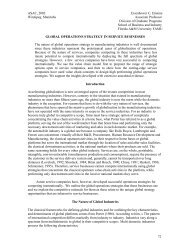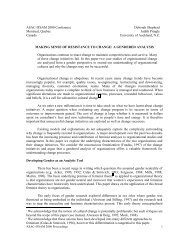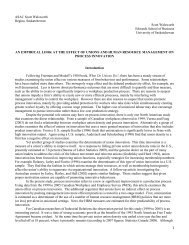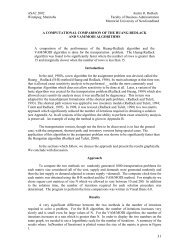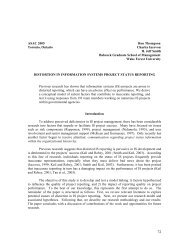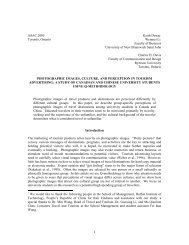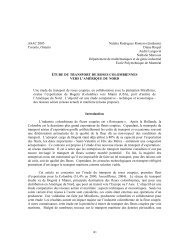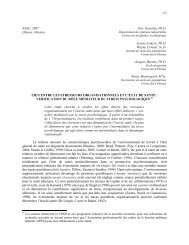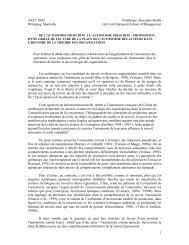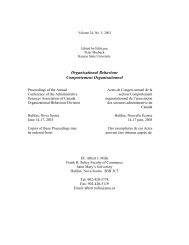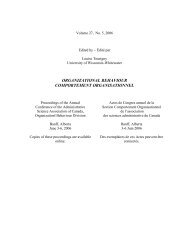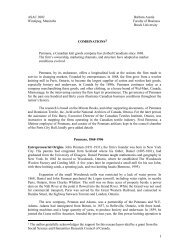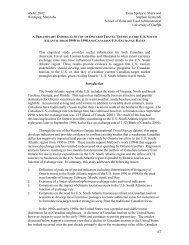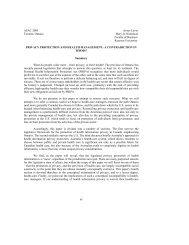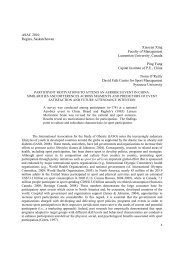104 TOTAL REWARDS FOR TECHNICAL WORKERS
104 TOTAL REWARDS FOR TECHNICAL WORKERS
104 TOTAL REWARDS FOR TECHNICAL WORKERS
You also want an ePaper? Increase the reach of your titles
YUMPU automatically turns print PDFs into web optimized ePapers that Google loves.
and the role of other rewards has become more prominent. This completes the review of the<br />
empirical work on rewards for R&D workers. We now turn to a consideration of its theoretical<br />
basis.<br />
A Theoretical Basis for Total Rewards<br />
To date, a sound, broadly accepted, theoretical base for the Total Rewards has not been<br />
presented, but some beginnings have been suggested. For example, O’Malley and Dolmat-<br />
Connell (2003) argue that three facets of commitment (organizational, occupational and<br />
beneficial) can form the basis of a “total relationship strategy” with employees. They<br />
demonstrate how the concept of commitment can underlie various management strategies that<br />
have to do with rewards. In another example, Kantor and Kao (2004) suggest that Total<br />
Rewards’ attention to a spectrum of rewards is consistent with long traditions of psychological<br />
and organizational theorizing going back through Lawler, Drucker and Maslow. The rewards<br />
included in Total Rewards run the gamut from personal and career growth (Maslow’s selfactualization<br />
need), through recognition and promotion (esteem needs), to benefits (security<br />
needs) and salary (to satisfy physiological and other needs). These approaches have some<br />
promise as avenues for providing a stronger conceptual basis for Total Rewards.<br />
However, Expectancy Theory (Vroom, 1964), given its good empirical support (Van<br />
Eerde and Thierry, 1996), can probably provide a more solid theoretical base. Expectancy theory<br />
proposes that workers will be motivated to exert a high level of effort in their work if they<br />
perceive that their efforts will lead to good performance (expectancy), that that performance is<br />
instrumental in obtaining the rewards offered by the organization (instrumentality), and that those<br />
rewards have significant positive valence (value) to the worker. These constructs can encompass<br />
Total Rewards concepts.<br />
Total Rewards proposes that organizations should offer their employees a number of<br />
rewards (not just pay and benefits) and should ascertain the relative values of those rewards to<br />
their workers so they can offer the most cost effective mix. In expectancy theory the value of<br />
rewards is called valence. The ascertaining of the value of rewards would, then, involve<br />
measuring the valences of the rewards which the organization might offer to workers. This could<br />
be done using the measuring techniques developed for the study of Expectancy Theory.<br />
Expectancy Theory is flexible in this consideration for it does not pre-specify any particular<br />
number or type of rewards but does specify that the more rewards there are of positive valence<br />
(assuming expectancy and instrumentality), the more motivated will be the workers. Expectancy<br />
Theory proposes the inclusion of as many rewards, and as many types of rewards, as the<br />
organization may wish to include, as does Total Rewards.<br />
Expectancy Theory, however, leads us beyond this prescription from the proponents of<br />
Total Rewards. Those proponents suggest that the value of rewards be measured and that the<br />
most valued rewards be offered (subject to a cost effectiveness consideration). They do not<br />
consider some of the subtleties suggested by Expectancy Theory. Expectancy Theory states that<br />
for motivation to occur employees must perceive expectancy and instrumentality while Total<br />
Medcof_ASAC2005<br />
113



